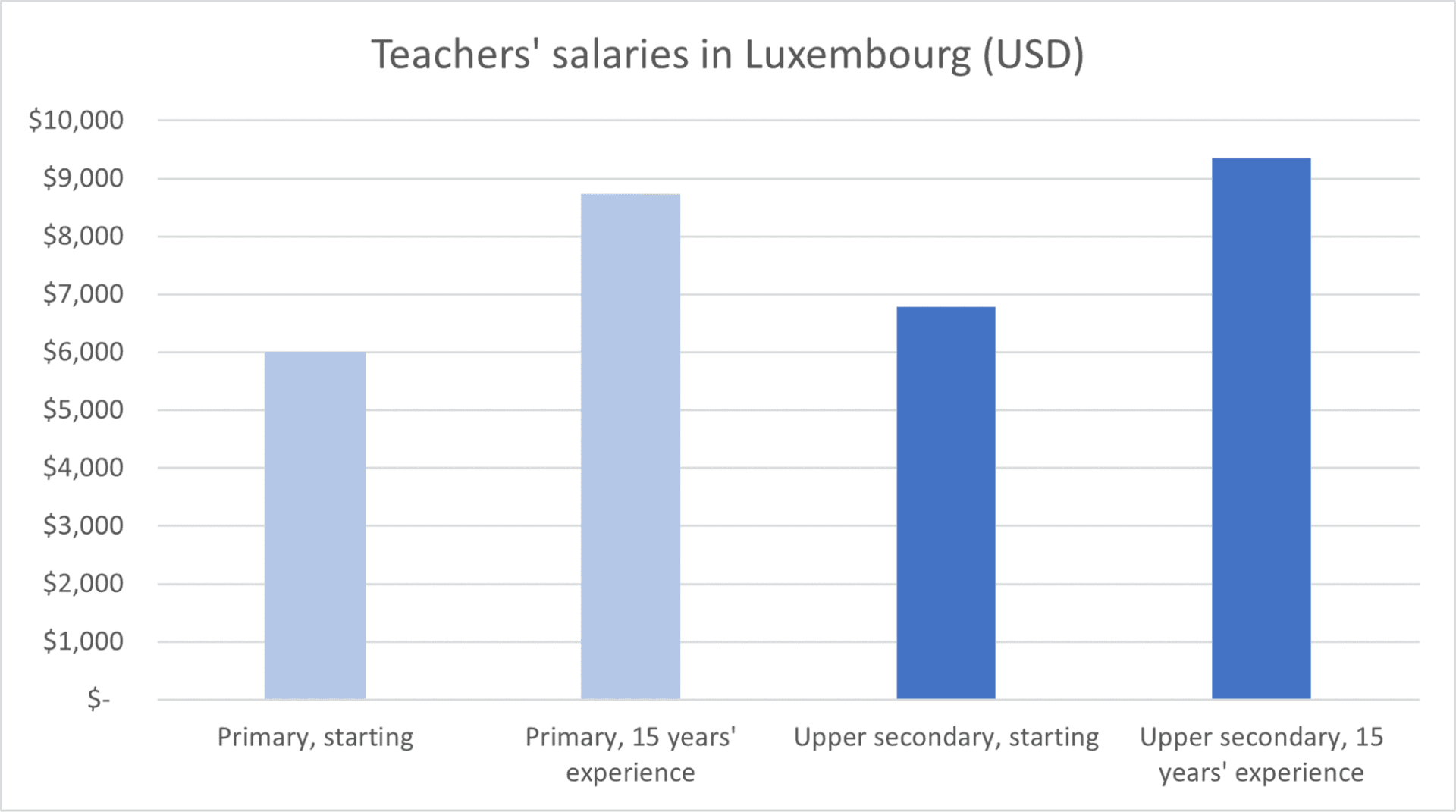
Working as an English teacher in Luxembourg
With this article, we will review the work conditions, salaries, benefits and requirements of teaching English in Luxembourg.
Luxembourg, a cosmopolitan country known for its high standard of living and multilingual population, offers ample opportunities for English teachers catering to non-native speakers. In case you know English as a native speaker, you might want to put your skills into practice and help people study.
Is there a demand for English teachers in Luxembourg
However, it's common for Luxembourgers to be proficient in four languages. Besides these core languages, English, Italian, Portuguese, and even various Slavic and Nordic languages find their place in this linguistic tapestry.
There are two main factors that explain the linguistic diversity in Luxembourg and the demand for English teachers.
The Luxembourg's inherently multicultural character
Ubiquity English
Given that context, the Luxembourgish educational system places a strong emphasis on language education to prepare students for this multilingual environment.

The demand for teachers is palpable in Luxembourg, not only for English teachers but also for teachers of other disciplines, and this is reflected in the new bachelor's degree for teachers that will open this fall and that we have covered in our news piece.
Not sure where to start your journey? Begin with a brief overview of Luxembourg's education system with our special article: Education in Luxembourg
General requirements for English teachers in Luxembourg
Navigating the requirements to become an English teacher in Luxembourg is contingent on the specific role you aim to pursue, and there are three primary pathways to consider:
- independent instructor,
- English teacher in a private institution,
- English teacher within a state educational establishment.
We'll delve into each of these routes, beginning with the simplest and progressing to the more intricate.
Requirements for private English tutors
The profession of a private English teacher is not regulated in Luxembourg, allowing anyone to take on the role of a private English tutor. However, there are essential prerequisites to ensure both linguistic competence in English and pedagogical skills.
Mandatory requirements
Optional requirements
Requirements for work in language schools
Another avenue to work as an English teacher in Luxembourg is by joining private institutions such as language schools or academic support organizations.
Mandatory requirements
Optional requirements
Requirements for work in public schools
Becoming an English teacher within a state educational establishment comes with a set of more intricate prerequisites. as it is more regulated. While it is possible to access these positions even if you are not a Luxembourg national, you must meet specific criteria:
- European Union (EU) citizenship or a valid work permit.
- Proficiency in the three administrative languages of the country: French, German, and Luxembourgish.
- Successful completion of a competition, with admission criteria varying depending on the level of the position you are interested in.
For teaching in secondary education
For teaching in primary education
For teaching in technical fields such as BEP/CAP
If you are interested in following this path but you still need to learn Luxembourgish, we suggest our article about the best language courses in Luxembourg to learn Luxembourgish.
Visa requirements for foreign English teachers in Luxembourg
As previously mentioned, whether you choose to work independently, for a private institution, or within a state educational establishment, you will need to be either a European citizen or possess a valid work permit.
Obtaining this work permit involves an administrative process and adherence to specific requirements. While these requirements may vary depending on your circumstances, the following are some commonly required documents and prerequisites:
- Two fully completed copies of the Schengen visa application form.
- Two recent and identical passport photos.
- A passport with validity extending at least three months beyond your intended stay.
- Proof of accommodation, even if temporary.
- An employment contract.
- The applicable visa fee.
If you want to learn more about the requirements to obtain a work permit in Luxembourg, we recommend you read our article dedicated to this topic.
Certification and TEFL requirements
The TEFL (Teaching English as a Foreign Language) certificate is a valuable credential for those aspiring to become English teachers in Luxembourg or elsewhere. This certificate can be obtained through a certified educational institution. Various entities are offering TEFL courses, each with different durations and delivery methods.
These courses come in a range of options, spanning from intensive 40-hour programs to comprehensive courses exceeding 200 hours. Courses can be conducted in various formats, including in-person, online, or hybrid.
TEFL qualifications are typically , with many employers requiring a certificate of at least 120 hours.
The duration of the course also varies depending on the number of hours and the chosen format. Online courses offer flexibility, allowing you to complete the training at your own pace, spanning from a couple of weeks to several years.
How much does a TEFL certificate cost?
When it comes to costs, the price of TEFL courses varies a lot depending on the school, the number of hours, and some other factors. In the following table, we have compiled some courses, but you can go directly to the websites of the entities that offer them or search for other institutions.
| Certification provider | Course name and hours | Cost of the course |
| TELF Org | 40-Hour Teaching Exam Preparation Classes | 89.50 euros |
| TELF Org | 120-Hour Premier Online TEFL Course | 219.50 euros |
| TELF Org | 200-Hour Online Level 5 TEFL Course | 324.50 euros |
| ICATEL | 120-Hour Online TEFL Certificate Course | 265 euros |
| Lifelong Learning | 100-Hour Certification TEFL | 900 euros |
Working conditions for English language teachers
When it comes to working as an English teacher in Luxembourg, you'll discover a range of factors that influence your working conditions, including salaries, working hours, and benefits. The Grand Duchy offers a high quality of life, but it's essential to understand the specifics of the job market for English teachers.
The standard working hours for teachers in Luxembourg adhere to the country's labor regulations, encompassing
This standard applies to teachers employed within state educational establishments or private institutions. On the other hand, if you opt for independent teaching in Luxembourg, you can enjoy greater flexibility in setting your working hours. This autonomy allows you to tailor your schedule to your preferences, offering a more adaptable work-life balance.
How much can you earn as an English teacher in Luxembourg
Salaries for English teachers in Luxembourg vary based on qualifications, experience, and employer. On average, English teachers in the country earn competitive incomes, particularly when compared to neighboring European nations.
In the broader field of providing education in Luxembourg, the average salary is approximately 5,150 euros per month, with a range
This comprises both the private and public sectors, while the private sector is more variable and difficult to analyze, the public sector is more transparent on this matter and the OECD data can give us some interesting information.

If you choose to work independently, your income won't be a fixed salary. Typically, independent English teachers charge on an hourly basis, with an average rate of around 30 euros per hour.
Where to look for jobs for English teachers in Luxembourg
In your quest to find English teaching opportunities in Luxembourg, strategic job hunting is crucial. This section outlines various avenues to explore when searching for teaching positions, whether you prefer working in established institutions or offering private lessons.

Best job portals to find work in Luxembourg
Begin your job search on reputable online platforms like LinkedIn, Indeed, and Glassdoor, which frequently list a range of job vacancies in English. These platforms offer user-friendly filtering options, allowing you to refine your search based on specific preferences and criteria.
Read more on the process of applying for a job and securing a position as an English teacher in Luxembourg in our related guides:
How to write a cover letter when applying for a job in Luxembourg
Private institutions that hire English teachers
Explore the numerous language schools in Luxembourg that cater to adults seeking to enhance their English proficiency for personal or business purposes.
- Schools such as Berlitz, Inlingua, and Language.lu often seek native English speakers to join their teaching staff.
- Additionally, consider international schools like St. George's International School, the International School of Luxembourg, and the European School, which may have openings for English language teachers.
is an alternative route that offers greater flexibility. Luxembourg is home to several multinational corporations and many of these may employ English teachers to help their staff augment their language skills.
Where to find opportunities as an independent teacher
For those desiring greater flexibility, independent teaching is an attractive option. Platforms like Superprof provide a means to create a profile and offer your teaching services to the public. This avenue allows you to reach both children and adults eager to improve their English skills.
Are you a in Luxembourg? Consider becoming an English teacher to work independently, and don't forget to read our guide article about student employment rules.
Frequently Asked Questions (FAQ)
What is the demand for English teachers in Luxembourg like
What are the salary prospects for English teachers in Luxembourg
Do I need to speak Luxembourgish or other languages besides English to teach in Luxembourg
Source: luxembourg.public.lu, superprof.lu, lesfrontaliers.lu, tefl.org, salaryexplorer.com
We took photos from these sources: Monica Sedra for Unsplash; Photo by Julia M Cameron for Pexels; OECD Education at a Glance 2022; Photo by Tima Miroshnichenko for Pexels